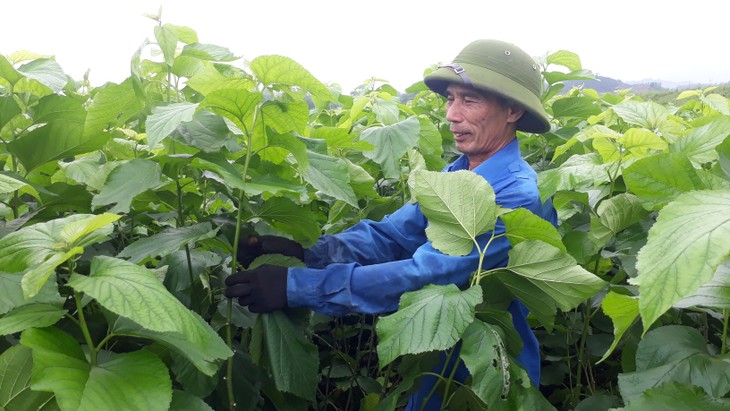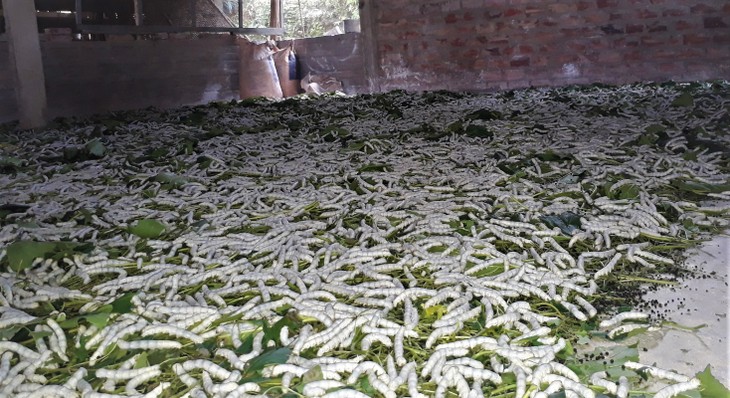(VOVWORLD) - The remarkable growth of agricultural production in Tran Yen district, Yen Bai province, in recent years is a result of local authorities identifying the best-adapted plants and animals. Tran Yen has shifted production, increased local income, and become the first new-style rural district in the region.
 Farmer Nguyen Duc Minh (Photo: VOV) Farmer Nguyen Duc Minh (Photo: VOV) |
Raising silkworms has boosted the income of Nguyen Duc Minh of Lan Dinh hamlet in Tran Yen, though it’s harder than farming.
“Let me give you an example. It takes at least 3 months to grow to 200 kilos of rice on 360 square meters, which earns 60 USD,” Minh said, adding, “If I raise five flat baskets of silkworms, I can harvest about 8 kilos of cocoons per basket, which can be sold for about 4.5 USD per kilo. That means I can earn more than 170 USD. There are two harvests like this each month. Generally speaking, the revenue from raising silkworms is much more dependable than growing rice.”
Nguyen Van Manh, Deputy Head of the district’s Agriculture and Rural Development Section, says the district has persuaded farmers to convert unprofitable rice fields along the Red River to mulberries and silkworms and has taught them the necessary techniques.
 Breeding silkworms has remarkably increased income for farmers in Tran Yen district over the years. (Photo: VOV) Breeding silkworms has remarkably increased income for farmers in Tran Yen district over the years. (Photo: VOV) |
Under the program, mulberry and silkworm areas have been set up to reduce production costs for farmers while increasing the quantity of silkworms raised in one area. Silkworm cocoons can be sold at a stable price of nearly 5 USD a kilo. After deducting production costs, the farmers have an income 5 to 7 times greater than from growing rice.
According to Manh, “At every stage or at the beginning of each crop, agriculture experts are sent to help local farmers with techniques for raising silkworms and prevent plant diseases by disinfecting tools, cleaning drying baskets, and ensuring mulberry leaves for the silkworms. Once they have good breeders, the process becomes very profitable.”
Tran Yen now has nearly 700 hectares of land devoted to mulberries and silkworms, mainly in Viet Thanh, Bao Dap, Y Can, and Quy Mong commune. This has become the main source of income for the locals.
Last year, despite the COVID-19 epidemic, raising silkworms earned them nearly 3.5 million USD.
Tran Dong, Chairman of the Tran Yen district People's Committee, said, “In its agro-forestry production plan until 2025, Tran Yen continues to identify the district’s key crops as mulberry trees and silkworms. It intends to expand to more than 1,000 hectares, while maintaining 3,500 hectares of bamboo shoots, and growing organic cinnamon.”
“To sustainably develop its key crops, the district is cooperating with businesses and agencies under the Ministry of Agriculture and Rural Development to find better mulberry varieties and organize the purchase and processing of silkworm cocoons, bamboo shoots, and organic cinnamon,” Dong concluded.
Tran Yen’s poverty rate has fallen to 4% and per capita income grew to more than 1,700 USD last year, making the district the first new-style rural district in the northwestern region.